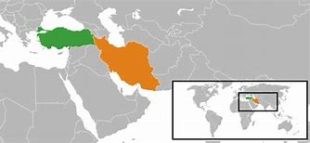RFL/RE – On November 20, 1998, journalist and translator Majid Sharif left his mother’s home in Tehran for a run. He never returned.
A few days later, his mother identified his body at a morgue. Sharif was found dead on a street in the capital. His death certificate said he died of a heart attack.

His suspicious death came amid the killings of several dissidents that were believed to be politically motivated and carried out by operatives of the intelligence service.
The victims were intellectuals and political activists who had publicly criticized Iran’s clerical establishment and state censorship. They had received threats and/or faced interrogations prior to their deaths. Some had been abducted and killed. Others were savagely slain in their homes.
Sharif is believed to be among victims of the so-called “chain murders” of intellectuals that shocked Iran in the fall and winter of 1998 and prompted reformist President Mohammad Khatami to order an investigation.
Reports that emerged months later suggested that Sharif had been kidnapped by security agents and killed with a lethal injection of potassium into his toe to cause a heart attack.
Iran’s Intelligence Ministry admitted to four killings in January 1999, blaming “rogue agents” for what was believed to be an attempt to silence dissent and undermine reformists.
Those crimes included the brutal November 1998 killings of Dariush Forouhar and his wife, Parvaneh, the leaders of a small opposition party, who died of multiple stab wounds in their Tehran home; and the December 1998 slayings of writer Mohammad Mokhtari and translator Mohammad Jafar Pouyandeh, both apparently strangled after being kidnapped on the streets of the capital.SEE ALSO:Outspoken Daughter Of Slain Iranian Dissidents Going On Trial For ‘Spreading Propaganda’
A total of 18 intelligence agents were arrested and put on trial, resulting in death sentences for three of them and prison terms for the others. Three were acquitted. The trial was seen as a sham amid suspicions that those who ordered the killings did not face justice.
In June 1999, the authorities announced that the man they said was the mastermind of the killings, senior Intelligence Ministry official Saeed Emami, had committed suicide in prison.There was a big man, we didn’t know who he was, the gist of his comments was that my brother’s murder was a simple mistake.
Washington-based human rights defender Roya Boroumand told RFE/RL that popular outrage following the 1998 killings — particularly the brutal stabbings of 70-year-old Forouhar and his 60-year-old wife — forced the establishment to accept limited responsibility as “a minimum to control, if not calm, popular anger.”
Boroumand, co-founder of the Abdorrahman Boroumand Center, which promotes human rights in Iran, said the killings reflect a lack of tolerance for dissent and religious competition. “These extrajudicial executions aim at eliminating specific people, but also, through their brutality and gruesomeness, deter a much more significant number of people from political activism and, at the same time, avoid the political cost associated with judicial prosecution and executions in which their responsibility is undeniable,” Boroumand said.
Journalists connected the killings to the suspicious deaths of dozens of intellectuals and dissidents that occurred a decade earlier. Lawyers pursuing the cases, as well as journalists investigating the killings and suggesting that the orders for them came from higher up, also faced pressure and jail terms. Families were also pressured.
‘A Simple Mistake’
Poet Hamid Hajizadeh and his 9-year-old son — who were killed in their home in Kerman in September 1998 — are also believed to be among the victims of the murders. Hajizadeh’s wife, who was sleeping in a room next to where the killings occurred, had apparently been sedated by the assassins. She discovered the murder scene and lifeless bodies of her son and husband hours later.
The poet had been stabbed 27 times while his son, Karun, had received 10 stabs to his chest.

Hajizadeh’s wife, Rouhangiz Soltaninejad, told RFE/RL’s Radio Farda that she can still picture those horrific scenes. “I will never forget,” she said, adding that she used to blame herself for bringing her son into this world. “I ran out of the house, yelling Karun’s name.”
Twenty-two years later, Soltaninejad is still waiting for a claim of responsibility for their deaths and for justice to be served. “I expect [the authorities] to follow up and [explain]. What [else] can I do?”
Hajizadeh’s sister, Farkhondeh Hajizadeh, said the Intelligence Ministry had told the family in 1999 that his death was the result of a “simple mistake.” “There was a big man, we didn’t know who he was, the gist of his comments was that my brother’s murder was a simple mistake,” she said, adding that “with a ‘simple mistake’ two people had been killed, they had been cut into pieces, they had been mutilated.”
The ministry did not officially accept blame for the killing of Hajizadeh and his son, or the death of Sharif. “They declared his cause of death as unknown,” Sharif’s wife, Mahshid Sharif, told RFE/RL. “They never accepted the complaint [we made] and their insistence in ignoring the case has led to questions not only for the family but for the intellectual community as well.”
Suspicious Deaths
Many other similar cases have remained unsolved.
They include the August 1998 disappearance of journalist Pirouz Davani and the December 1996 killing of the Sunni Friday Prayers leader of Kermanshah, Molla Mohammad Rabiee, who is known as Mamusta Rabiee.
Davani went missing after leaving his home and his body was never found, amid rumors he had been “executed.” Paris-based Reporters Without Borders (RSF) said in 2003 that Iranian “authorities have never shown any interest in solving his disappearance and those responsible for it thus enjoy total impunity.”

Like Davani, Rabiee left his home and never returned. His body was found hours later lying next to his car. His wife, Ayasheh Mafakheri, told RFE/RL’s Radio Farda that there were signs suggesting there had been foul play. “There were traces of an injection on his legs. There were marks on his neck,” she said.
His suspicious death led to deadly protests in Kermanshah, a city in western Iran. The family was pressured by authorities to proclaim that Mamusta Rabiee had died of a heart attack.
But his wife refused. “I’m not afraid of anything. You killed my husband…I won’t sign any [document],” she said.
After the reports of the 1998 killings, Mafakheri pushed for her husband’s death to be investigated as part of the serial murders of dissidents and intellectuals. But her efforts proved fruitless.
“In the parliament I was told that [Mamusta Rabiee] is among the [victims] of the ‘chain murders.’ I went to a lawyer, but I received no answer,” she said.
- Golnaz EsfandiariGolnaz Esfandiari is a senior correspondent with RFE/RL.
 Shabtabnews In this dark night, I have lost my way – Arise from a corner, oh you the star of guidance.
Shabtabnews In this dark night, I have lost my way – Arise from a corner, oh you the star of guidance.


